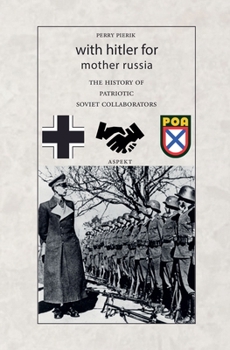With Hitler for Mother Russia
About 1 million inhabitants of the Soviet Union collaborated with the Nazis. This is a remarkable fact, because the Nazis, thanks to their racial policy, could not really be considered allies. And yet it happened. The aversion to Bolshevism and the hope for new freedom opened up a horizon in which collaboration between the Soviet peoples and the Germans seemed to offer a better alternative than the 'Soviet paradise'. Historical oppression and bloody experiences played a major role in this, especially among the Ukrainian, Crimean and Caucasian peoples. But there were also Russians who longed for the tsarist times of old. Within Nazi Germany, there was much resistance to this collaboration, but others were more practical and saw in the help of Soviet collaborators precisely the solution to the long campaign in the east. This led to a difficult but ultimately very large scale collaboration. Using documents and literature, the book gives an insight into the broad outlines of this extraordinary event. It was also a dramatic event, because the collapse of the Third Reich put the Osttruppen's desire for freedom into question, and a terrible end to it was drawn.





